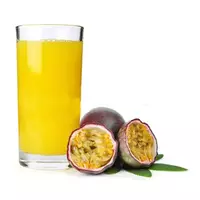Passion fruit juice

In the literature there are quite a lot of names for such a famous tropical plant as passion fruit. passiflora or strastaceae edible, as well as granadilla purple or Passiflora edulis, all these are the names of the same species of plants, ranked in the genus Stastotvets. Passion fruit is often called passion fruit or peshenfruit.
In the Dominican Republic, passion fruit is called nothing more than chinola. The amazing plant with many names in nature grows in the territory of the countries of South America, namely in Argentina, Brazil and Paraguay. In addition, it is found in its natural habitat in New Zealand, Hawaii, as well as the Galapagos Islands. In addition, passion fruit is currently cultivated in Southeast Asian countries.
Modern science knows about 400 different species of passion fruit plant. Many representatives of this type of plant grow for ornamental purposes and only the fruits of several species are consumed. Passion fruit is used both fresh and processed. In its appearance, passion fruit resembles something a small apple with a dark skin, as well as unusual contents.
The flesh of passion fruit is a juicy and sweet substance from the seeds of the plant. It is worth noting that passion fruit juice has been especially popular at all times. The thing is that maracui juice has unique natural properties that have a favorable effect on the entire human body as a whole.
The main feature and characteristic feature of passion fruit juice is the ability of the drink to have an instant tonic effect on humans. Often quite cloying and sweet to taste passion fruit juice is mixed with orange or other varieties of the drink. In addition, passion fruit juice is part of many cocktails, including famous ones around the world.
Typically, passion fruit juice is used to mix cocktails involving tequila, bourbon, whiskey and liqueurs. Passion fruit juice perfectly shades the taste of noble alcoholic beverages, and combined with citrus juice gives the finished cocktail an unforgettable taste and aroma. The pulp of the plant fruits contains up to 40% passion fruit juice. Passion fruit juice contains a significant amount of naturally useful compounds for the human body.
For example, the composition of passion fruit juice is enriched with vitamins of group A, E, C, K, B, as well as N. In addition, passion fruit juice contains such useful macro- and trace elements as fluorine, sulfur, manganese, iodine, sodium, as well as zinc and iodine. Based on all the above, we can conclude that passion fruit juice is not only tasty, but also a healthy tonic drink.
passion fruit juice 23.2 kCal
Energy value of passion fruit juice (Ratio of proteins, fats, carbohydrates - ju):
Proteins: 0.7 g (~ 3 kCal)
Fats: 0.2 g (~ 2 kCal)
Carbohydrates: 4.5 g (~ 18 kCal)
Energy ratio (bj | y): 12% | 8% | 78%
 Español
Español Français
Français Português
Português Русский
Русский 简体中文
简体中文 繁體中文
繁體中文 日本語
日本語 한국어
한국어 العربية
العربية Türkçe
Türkçe Қазақ
Қазақ Deutsch
Deutsch Italiano
Italiano Українська
Українська
